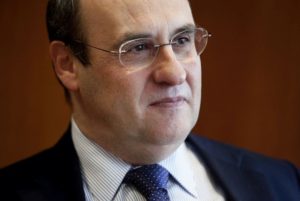New IOM head faces acid test
 Former Portuguese lawyer and politician António Manuel de Carvalho Ferreira Vitorino has been elected as the International Organisation for Migration’s (IOM) next Director General.
Former Portuguese lawyer and politician António Manuel de Carvalho Ferreira Vitorino has been elected as the International Organisation for Migration’s (IOM) next Director General.
Mr Vitorino succeeds American William Lacy Swing as head of the United Nations’ migration agency on October 1.
The former European Commissioner for Justice and Home Affairs faces a tough time in one of the most important jobs on the planet.
Recent drownings in the Mediterranean and the standoff on the US-Mexico border confirm how critical the role of DG of IOM will be for the UN and the world.
Mr Vitorino’s overarching task will be to provide leadership in finding a way out of the morass that is migration policy around globe.
He must try to shift the narrative away from the idea that migration is a crisis and more towards pragmatic solutions that embrace the notion that migration is here to stay and it is manageable.
Marta Foresti, the Director of the Human Mobility Initiative at the London–based think tank the Overseas Development Institute, says this means “brokering deals, nurturing debates, fostering innovations, and spotting concrete opportunities and entry points for reform, wherever they exist”.
“It means working not only at the national or state level but driving change from the ground up by engaging with local officials as well as members of civil society groups and businesses,” Ms Foresti says.
She says the new DG must reach outside the multilateral system to new allies, especially those with a real desire and capacity to demonstrate in practice how to better manage global migration.
“Mayors come to mind, as do business leaders (in the tech or engineering industry, for example), who need to access talent wherever it is in the world, and some governments – especially those that have demonstrated commitment to innovative practices and realistic reforms, from Canada and Germany, to the Philippines and Uganda,” Ms Foresti says.
“Internally, within the UN, the new director general must develop stronger partnerships and strategic alliances at a time of wide-ranging UN reform.
“This is key if IOM hopes to deliver on one of its most important and strategic mandates: the implementation of the first intergovernmental Global Compact for Migration, to be agreed by UN members states in December,” she says.
Mr Vitorino will also have to tackle the behemoth that the UN has become. He will need to forge relationships and collaboration with other UN agencies overseeing related areas such as the International Labor Organisation, UNICEF, the United Nations Development Program, the World Health Organization, and the United Nations Department of Economic and Social Affairs – not to mention the UNHCR.
IOM has only recently joined the UN, so there is work to be done to forge these relationships.
Ms Foresti says that politically, the new DG must perform a balancing act between building relationships with its member states and the emerging economies on the front lines of displacement and also keep the US and Europe happy.
Mr Vitorino was elected to Portugal’s Parliament in 1980. In 1983 he became Secretary of State for Parliamentary Affairs.
He later served as Deputy Secretary for the Governor of Macau until 1989, when he returned to Lisbon to become a judge of the Constitutional Court, a term that ended in 1994.
He subsequently served as Minister for National Defence and Deputy Prime Minister within the government of António Guterres, now the United Nations’ Secretary General.
From 1999 to 2004 António Vitorino served as the European Commissioner for Justice and Home Affairs.
During his tenure, Mr. Vitorino participated in conversations that led to the drawing of the Charter of Fundamental Rights of the European Union and the Convention on the Future of Europe.
Laurie Nowell
AMES Australia Senior Journalist












